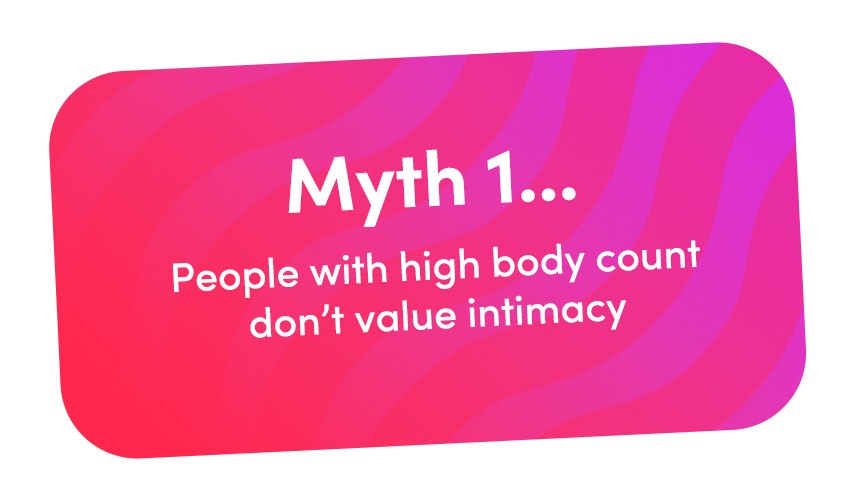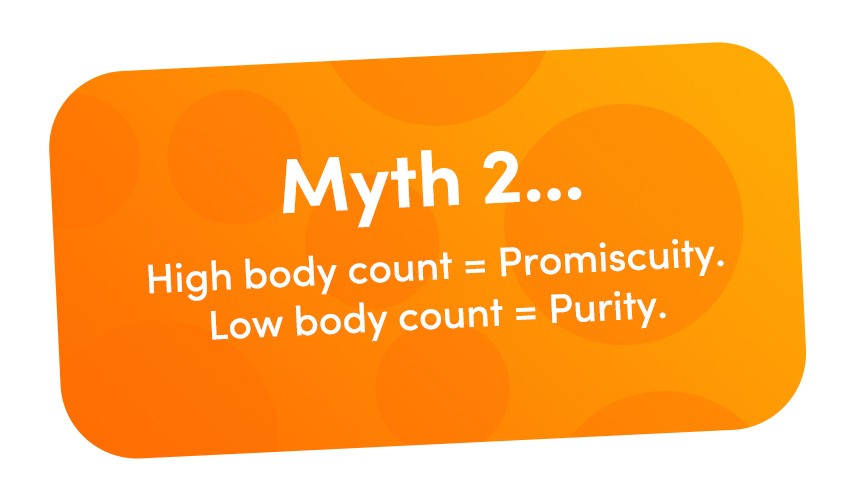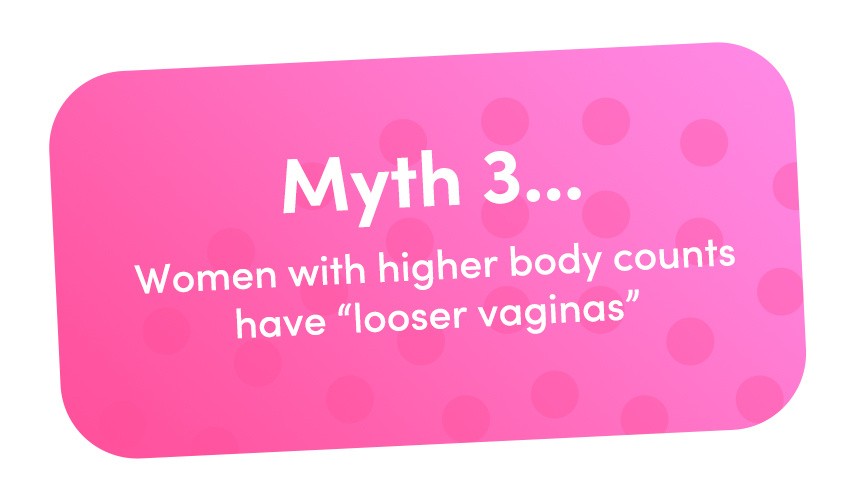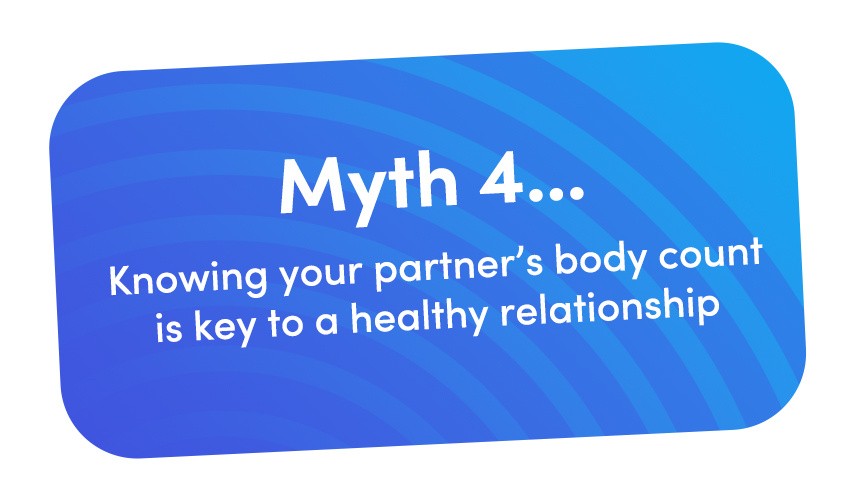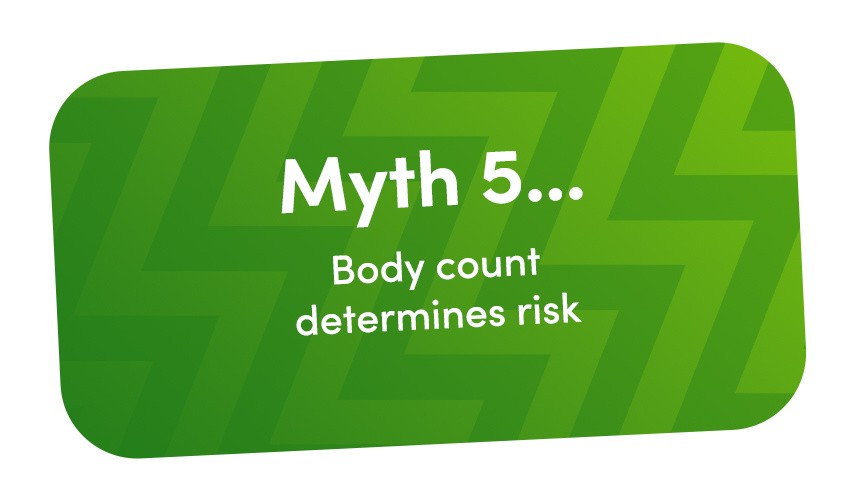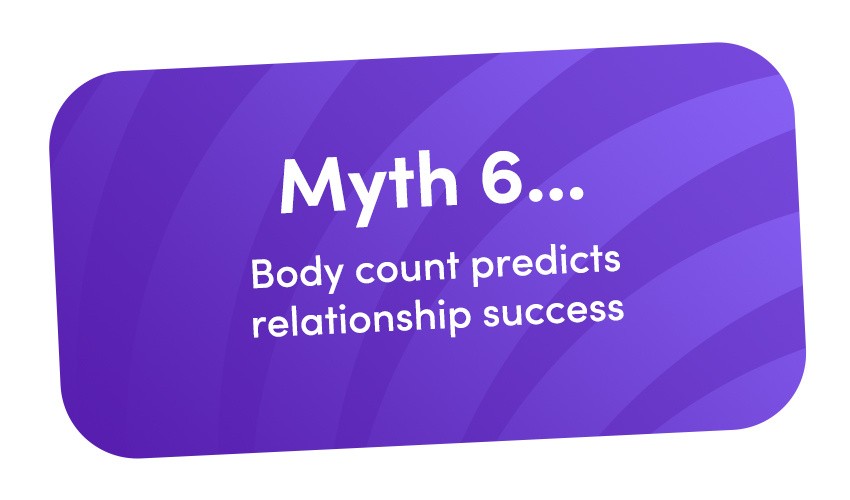When it comes to dating, your ‘body count’ is the number of people you’ve slept with. Seem important? Maybe not...
In a recent survey, we asked over 2,000 people in the UK: “Does body count bother you? Or if you haven’t yet had a sexual partner, do you think it would bother you?” The results were intriguing.
We asked sex and relationship expert, Annabelle Knight, to explore the results with us and offer her advice for navigating the body count conversation.
At first glance, the numbers we quite sex positive. 69% of respondents said no, body count doesn’t bother them. 29% said they would be bothered by body count, while the remaining 7% weren’t sure or preferred not to say.
These results point to a cultural shift: more than ever, people seem to be rejecting shame and challenging outdated taboos when it comes to sex. But with nearly a quarter of respondents still saying a partner’s sexual history matters to them, it's a reminder that sexual values are personal – and that’s OK too!
Whether you’re proudly sex-positive or prefer to take things slow, the conversation around body count is clearly still alive and evolving – and at Lovehoney, we’re here for it.
The gender split
Do women care about body count?
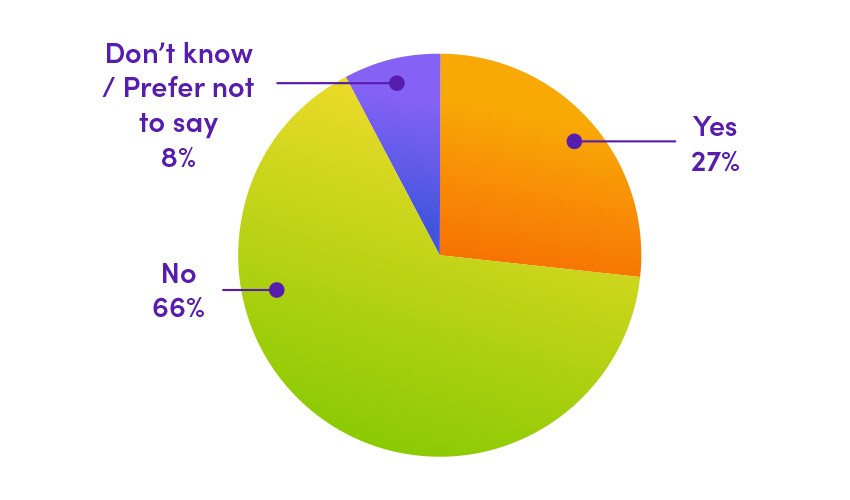
When we looked at how women responded, we saw a very similar story – the majority aren’t too worried about their partners’ sexual history.
66% of female respondents said a partner’s body count wouldn’t bother them, embracing the sex-positive sentiment we saw overall. But 26.7% said it would matter, and 7.9% said they weren’t sure or preferred not to say.
So, why do over a quarter of women worry about body count?
These results could reflect a range of things; from personal values to how women are socially conditioned to think about sex and relationships.
Women have long been pitted against one another and judged for their sexuality – perhaps knowing a partner has a high body count emphasises the feeling of having to compete with other women to keep their lover’s attention.
Do men care about body count?
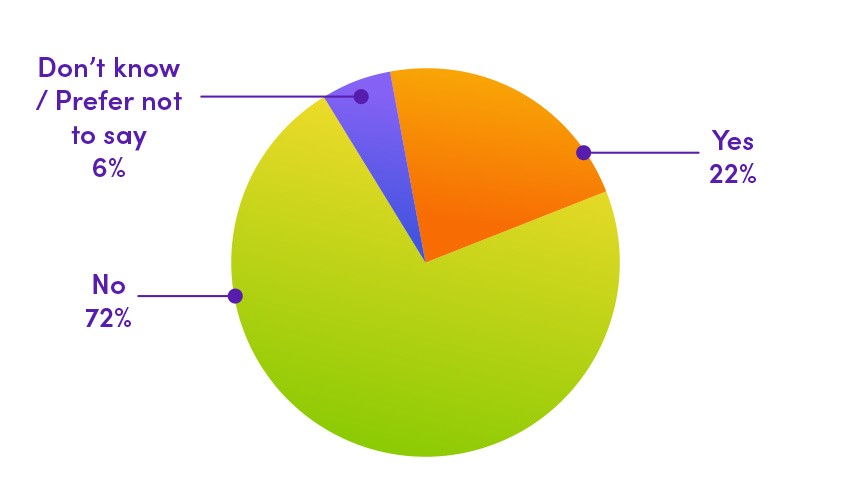
When we asked male respondents if a partner’s body count would bother them, a striking 72% said no. Only 22% said yes, and 6% were unsure or preferred not to say.
This actually challenges a long-held stereotype. In pop culture – and even in outdated dating advice – it’s often assumed that men are the ones who care more about a partner’s sexual history. But according to our data, men were more likely than women to say it doesn’t bother them at all.
So what’s going on here?
It could be a reflection of shifts in relationship expectations or just a new generation of men pushing back on the old-school double standards that have long governed dating norms. Men are usually encouraged to have more sexual partners – egged on by their peers and role models – so why should women have less?
Whatever the reason, it’s encouraging to see men showing a more relaxed and progressive attitude toward sexual history. After all, confidence, communication, and mutual respect are far more important than any number – and we love to see that message landing across all genders.
Annabelle's perspective...
"Seeing that men were more likely than women to say a partner’s body count doesn’t bother them might surprise some people, but it’s a really positive sign of changing attitudes," says Annabelle.
"Historically, women have faced more scrutiny when it comes to sex and relationships, while men have often been praised for experience. That kind of double standard creates pressure on both sides – women might feel judged, while men might feel like they have to project a certain image.
"But these results suggest we’re moving past that," Annabelle says. "More men are clearly comfortable rejecting those outdated expectations and prioritising things like emotional connection, trust, and sexual compatibility over someone’s sexual history.
"What’s important is that we keep having these conversations without shame or judgement. There’s no ‘right’ number; just the right communication, honesty, and respect between partners."
The generational gap
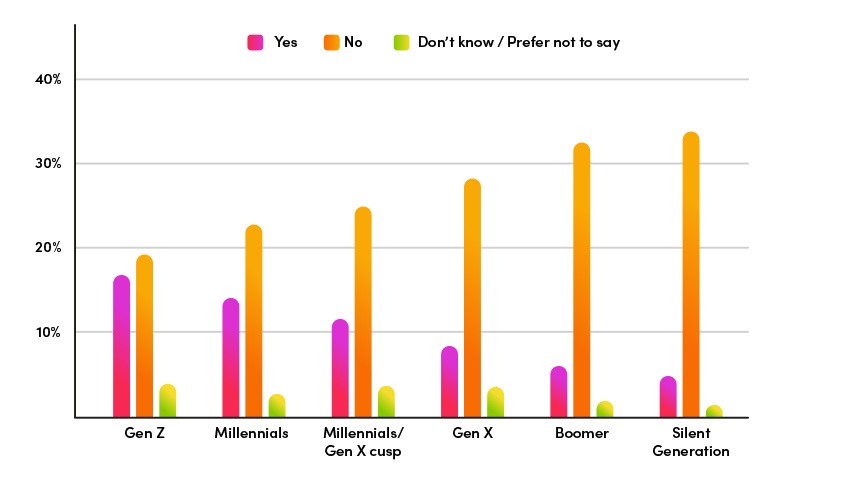
42% of Gen Z respondents (aged 18–24) said a partner’s body count would bother them, while just 48% said it wouldn’t. That makes Gen Z the most likely group to say body count matters – and the least likely to say it doesn’t.
Compare that to the over-65s (Silent Generation), where a huge 84% said body count doesn’t bother them – with only 12% saying it does.
In fact, as age increases, concern about a partner’s sexual history steadily declines:
Millennials (25–34): 35% said yes, it matters
Millennials/Gen X cusp (35–44): 29% said yes
Gen X (45–54): 21%
Boomers (55–64): 15%
Silent Generation (65+): 12%
So… What’s with the clear generational divide? We have a theory or two.
It may be that the older generations have gained perspective with age and wisdom – valuing intimacy, compatibility, and trust far more than the number of partners. They may have also grown more secure in their own sexual identity and are less concerned with comparison or judgement from others.
On the other hand, younger generations are having to navigate dating and romance in a very different world – one that has become shaped by dating apps, social media, and often unrealistic relationship expectations. Body count might be seen as less of a moral issue, and more about insecurity, perceived gaps in experience, or the pressure to “keep up”.
Annabelle’s perspective…
There’s often this assumption that younger people are the most open-minded when it comes to sex, but these results appear to challenge that.
"Younger generations like Gen Z are growing up in a digital age, where comparisons are constant and dating can feel transactional. This could lead to more anxiety around sex, and more focus on numbers rather than genuine connection," says Annabelle.
"On the flip side, older generations have lived through those messy, meaningful, long-term experiences – and for many of them – body count doesn’t even come into the equation anymore," she adds.
"What this tells us is that sexual openness doesn’t always correlate neatly to age. Confidence, communication, and emotional maturity grow over time, and with it, a much healthier perspective on what really matters in a relationship."
Sticking with the same theme, we posed a new question: ‘How many previous sexual partners would you say it’s acceptable for a new partner to have had?”
The most popular answer? “Don’t care.”
26% of respondents said a partner’s past doesn’t matter to them: full stop. That’s a powerful statement about sexual acceptance, suggesting that for many, it's not about how many, but how they connect with you now.
But the rest of the results show just how diverse (and occasionally cautious) opinions still are.
What’s an acceptable number of previous sexual partners?
22% said 3–5 previous partners felt acceptable
17% said 5–10
16% said 1–2
5% said 11–25
2% said 25–50
Only 1% said they’d accept 50+
And 3% actually preferred zero
So while over a quarter of Brits are leading the way to sex positivity, it’s clear that some of us are more cautious or traditional.
The gender split
What number do women prefer?
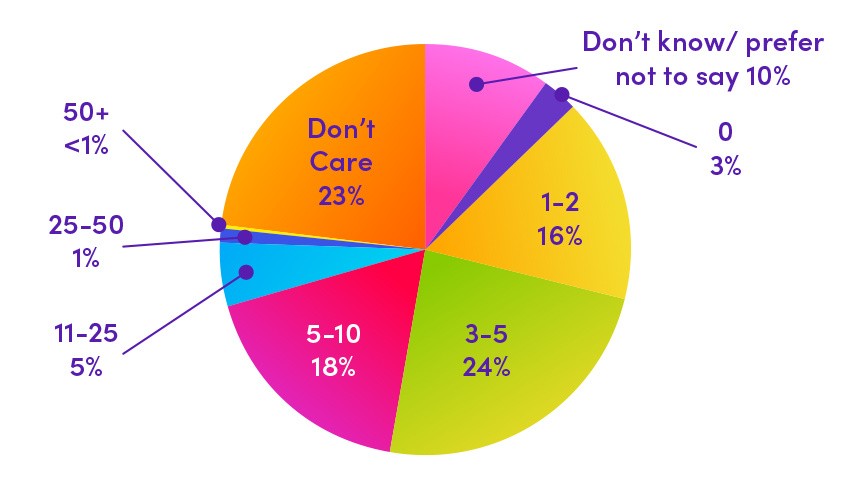
When asked how many previous partners is “acceptable”, nearly a quarter of women said they don’t care (23%), suggesting a consistent trend of open mindedness.
What number do men prefer?
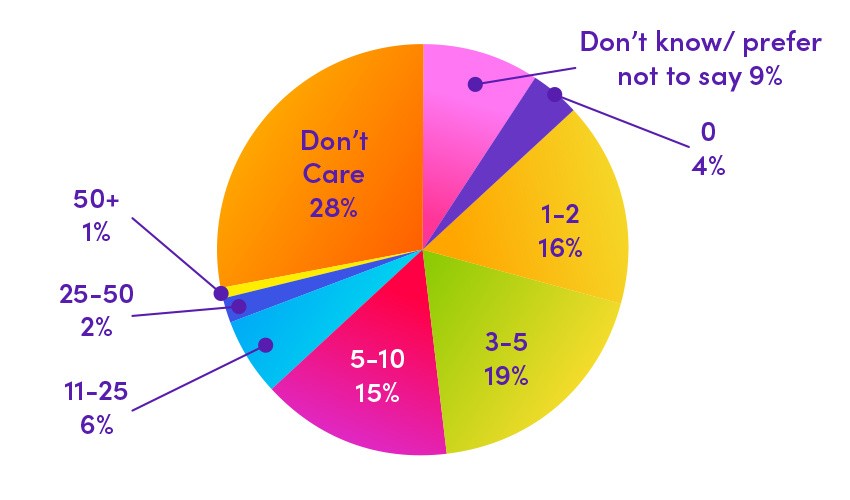
When it comes to the number of previous partners, men’s responses were very similar to women’s, with a good chunk of respondents still showing a preference for low numbers, but a significant 28% saying they don’t care about their partner’s sexual history.
Here’s how the numbers break down at a quick glance:
24% of women said 3-5 previous partners was acceptable
18% said 5-10
16% said 1-2
5% said 11-25
3% said they’d prefer zero!
Just 1% said 25-50 partners
So, while many women still prefer lower numbers, the fact that nearly one in four are completely unconcerned with a partner’s past highlights a shift away from shame or judgement, and a stronger focus on emotional connection and trust over history.
Let's compare that to men:
19% of men were comfortable with 3–5
16% said 1–2
15% said 5–10
6% said 11–25
4% of men said zero partners would be ideal
2% said 25–50
1% said 50+
Similar to women, men are showing a growing trend toward focusing less on numbers and more on emotional connection – though some still have clear preferences about their partner’s past.
Annabelle’s perspective…
"It’s interesting to see how closely aligned men and women are when it comes to how many previous partners they find ‘acceptable’ in a new relationship," says Annabelle. Both genders show a strong preference for relatively low numbers, but what really stands out is that around a quarter of both men and women say they simply don’t care about their partner’s past – and Annabelle thinks that’s a very encouraging sign.
"This tells us that more people than ever are moving away from the judgement and stigma that the numbers conversation brings, and are focusing instead on what really matters: the quality of the connection they have right now," she says.
"Of course, personal boundaries are important, and it’s natural for some to have preferences about a partner’s sexual history. The key is open communication - knowing what you’re comfortable with and sharing that honestly with your partner, without shame or pressure."
The generational gap
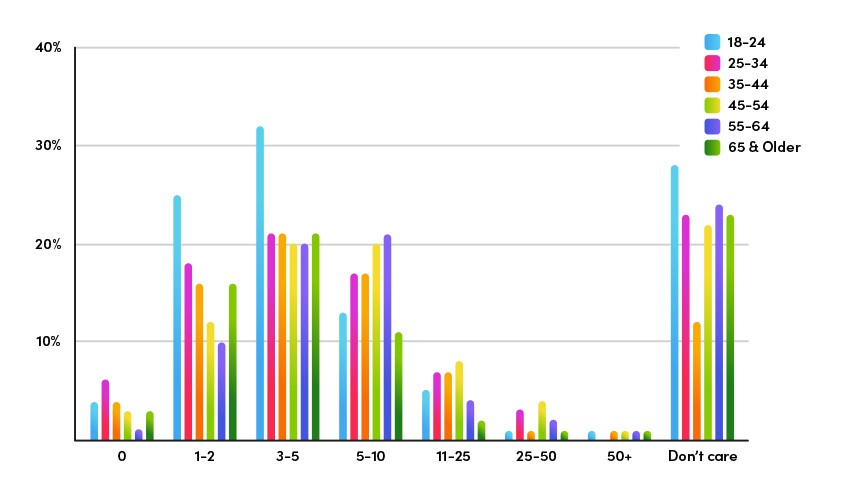
When we break down the results by generation, the numbers are intriguing! While every age group has its preferences, younger people appear both the most idealistic, and the most open-minded… Depending on how you look at it.
Gen Z (18–24)
This generation’s most common response was 3–5 partners (32%)
25% chose 1–2, while 4% said they’d prefer their partner had no experience at all
Yet 28% – the joint highest of any age group – said “don’t care”
So Gen Z appears split: some want limited experience in a partner, while just as many are entirely unfazed.
Millennials (25–34)
Slightly more relaxed than their younger counterparts, with fewer choosing 1–2 (18%) and more open to 11–25 (7%)
“Don’t care” still going strong at 23%
Gen X (35–54)
Spread out more evenly across categories…
Preference for 3–10 partners was consistent across both 35–44 and 45–54 groups
Interestingly, the lowest “don’t care” score came from 35–44s (12%), suggesting this may be the most “numbers-aware” group
Boomers (55–64) and Silent Generation (65+)
Very similar responses for the older generations
Strong support for 3–10 partners
“Don’t care” rose again: 24% for 55–64s, 23% for 65+
Annabelle’s perspective…
"What really stands out to me is that younger people – especially Gen Z – seem to be navigating a tension between ideals and acceptance," says Annabelle.
Many say they’d prefer a partner with limited experience, but at the same time, they’re just as likely as older generations to say they ‘don’t care’ about body count. "This shows a shift towards emotional openness, even if those traditional ideas around ‘acceptable’ still linger," she adds.
"Interestingly, the 35–44 age group – who are most likely to be in long-term relationships or raising families – appear to be the most cautious. Fewer people in this category chose ‘don’t care’ and seemed more likely to gravitate towards a specific comfort zone," says Annabelle.
"But as we move into the older generations, we see something refreshing: Boomers and over-65s seem to mellow out about body count. With experience comes perspective, and more of them are saying, ‘It’s not about the number, it’s about the person."
"Whether your number is one, none, or well into the double digits, the truth is this: your body count doesn’t define your value, your desirability, or your capacity to love and be loved," says Annabelle Knight. "We all bring different experiences to the bedroom – and that’s something to celebrate, not judge."
Here's Annabelle's advice on navigating conversations around previous sexual partners.
Ultimately, there’s no universal rule, but early-stage dating might not be the right moment for a numbers chat. Focus on emotional and sexual compatibility first. Every couple sets their own rhythm; some choose to dive deep early on, whereas others wait until things are more established.
Be honest if you feel hesitant. A respectful partner will value how you feel about the question, not just the final answer.
Use their answer as a conversation starter, not a dealbreak. Ask questions - if you both feel comfortable, share your feelings without blame, and remind yourself that your partner’s past doesn’t define their ability to be a present, loyal and loving partner with YOU.
Across the survey results, we saw some differences between genders and generations, which is only natural.
Younger people might still be exploring boundaries, while older generations often show greater sexual confidence and openness. And while men and women may approach the conversation differently, we’re clearly shifting towards a more sex-positive and less judgemental culture.
According to Annabelle, "what really matters is how we treat each other: with kindness, respect, and openness."
Healthy relationships thrive on communication, not comparison, and that means being honest when it feels right, asking questions without judgement, and understanding that every couple has their own version of what ‘normal’ looks like.
"So if you find yourself thinking about your number - or someone else’s - remember: it’s not about the past, it’s about the connection you’re building now," she adds.
Sources
All statistics mentioned in this article are from a Lovehoney UK survey with Cint; 2,016 nationally representative respondents, UK adults over the age of 18 (June 2025)


